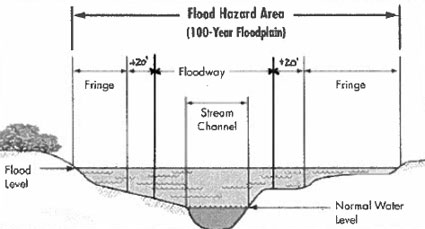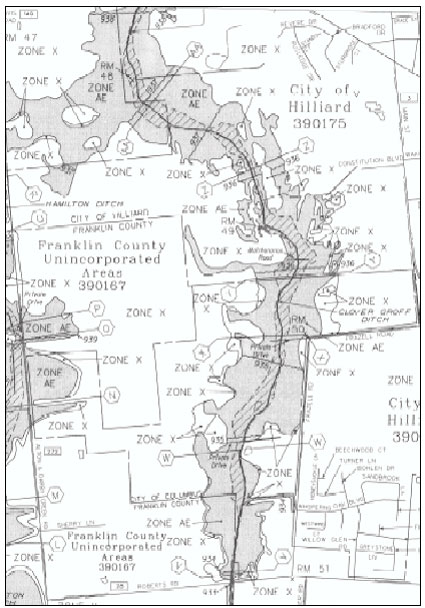Stormwater Management
Stormwater
What is stormwater?
Stormwater runoff is generated when rain or melted snow flows over land or impervious surfaces, such as paved streets, parking lots and building rooftops, and does not soak into the ground. As the runoff flows over the surfaces, it accumulates debris, chemicals, sediment or other pollutants that could adversely affect water quality if the runoff is untreated.
In natural areas, stormwater runoff is absorbed by the ground. It is filtered and ultimately replenishes underground water deposits or flows into waterways. In developed areas, impervious surfaces prevent stormwater runoff from naturally soaking into the ground. Instead, the stormwater runoff rapidly enters storm drains, sewer systems and drainage ditches. This can cause:
- Downstream flooding
- Contaminated waterways
- Stream bank erosion
- Increased sediment in the waterways from erosion
- Habitat destruction
- Changes in the stream flow
- Infrastructure damage
The City owns and maintains a system of inlets, ditches, pipes and ponds that are designed to carry stormwater runoff away from streets and buildings to the waterways. Unlike sanitary sewer systems, the storm sewer system does not lead to a treatment plant. It carries stormwater runoff directly to local waterways.
Why is stormwater management important to the City of Dublin?
Dublin is well known for its parks and open spaces, which also include our many waterways. The City’s Community Plan calls for providing for safe and efficient collection of stormwater and continuing to maintain and improve the water quality of the Scioto River and its tributaries.
Dublin is also required by the United States Environmental Protection Agency to comply with its National Pollutant Discharge Elimination System Phase II municipal separate storm sewer system program. This program requires local governments with fewer than 100,000 people to develop a plan to reduce stormwater pollution in order to protect and improve waterways. The Ohio EPA manages the compliance of the local jurisdictions with their NPDES Phase II MS4 permits.
The program is comprised of six control measures that when implemented should result in a significant reduction of pollutants discharged into receiving waters. The control measures are:
- Public Education and Outreach: distribution of materials and performing outreach to inform citizens about the impacts of polluted stormwater runoff
- Public Participation and Involvement: programs and events that involve people in stormwater management
- Illicit Discharge Detection and Elimination: detection and elimination of illegal discharges to the storm sewer system and improper disposal of waste
- Construction Site Runoff Control: management of sediment, excessive runoff and pollution from construction sites
- Post-Construction Runoff Control: management of stormwater runoff and pollution from development projects that are permanent facilities
- Pollution Prevention and Good Housekeeping: management of municipal facilities and operations to reduce pollution
The City has developed an updated Stormwater Management Program Plan that outlines how the City will meet the minimum control measures during the current permit term.
The City is required to submit an annual report that demonstrates how the City addressed each of these minimum control measures. Click here to review Dublin’s 2022 NPDES report.
What can you do to help protect Dublin’s waterways?
Residents can do the following:
- Fertilize Properly
- Rake Right
- Smart Watering
- Pick up after your pet and properly dispose of waste in a trash receptacle
- Wash vehicles on lawn or other pervious surface away from storm drains
- Keep chemicals and paints away from storm drains and dispose of them properly
- Incorporate stream buffers into your backyard conservation
- Install rain barrels
- Pond management and maintenance
- Proper household hazardous waste disposal
- Proper Planting
Commercial properties and managers can learn more about:
- Stormwater Pollution Prevention for Small Businesses
- Water Quality Partner Program Letter | Pledge
- Golf Courses
- Restaurants
- Mobile Power Washing
What is the City doing to protect the waterways from changes that occur with development?
The City has developed both the current stormwater code and the Stormwater Management Design Manual. The purpose of these is to set the City’s standards for stormwater management and to maintain uniformity in the design standards used for stormwater management. The Manual enables the City to provide effective and efficient review of design data and to provide designers with clear guidance in preparing stormwater management plans. These plans and designs are routinely reviewed for each development project and are contained in the applications that are reviewed by the Planning and Zoning Commission.
Through the standards and practices incorporated in the Manual, the City encourages the use of stormwater treatment and engineering methods that allow for groundwater recharge and that manage stormwater as close to its source as possible. Specifications for stormwater control measures that use vegetation and soil media to filter, treat or infiltrate stormwater, often referred to as “Low Impact Development” or “LID BMPs,” have been incorporated into this Manual. These practices are encouraged to be used in Dublin where suited to the site and development conditions.
Stormwater Management Design Manual Interim Update
This interim update has modified the water quality calculations (WQv), rainfall depth (for WQv calculations), and references for the current Ohio EPA Construction General Permit (OHC000005) to comply with the current Ohio EPA Construction General Permit.
Floodplain Management in Dublin
Dublin has participated in the National Flood Insurance Program (NFIP) since 1980 by Ordinance 27-80. The NFIP makes flood insurance available to property owners in communities that agree to adopt an ordinance regulating development in flood prone areas. The floodplain regulations required by NFIP are designed to accomplish three basic objectives related to flood damage protection:
- To prevent new developments from unduly increasing flood damages to others;
- To ensure that new buildings will be free from flood damage; and
- To ensure that existing buildings, when substantially damaged or improved, will be brought up to current floodplain regulations so they will be flood protected.
Dublin’s code exceeds these minimum requirements. Chapter 151 – Flood Controlrequires the necessary controls and provisions, but also includes a 20 foot buffer zone to floodways. No fill shall be placed between the floodway and the base flood elevation (flood fringe) or between the floodway and 20 feet from the floodway, whichever is less. See the graphic below for additional clarification.

Click here for detailed information on Floodplain Regulations in Ohio
Under NFIP, the Special Flood Hazard Area (SFHA), otherwise known as the Floodplain or 1 percent chance of a flood, is the area of land that would be inundated by the base flood (see the above graphic.) This floodplain is the area regulated by Dublin for compliance with the NFIP and where the mandatory flood insurance purchase requirement applies. The floodplain is shown on the Flood Insurance Rate Maps (FIRM) provided by the Federal Emergency Management Agency (FEMA). These are the maps that lending institutions use to determine if floodplain insurance is required for a property.
If you are doing work in the SFHA, you will be required, as part of the building permit, to also submit a Special Flood Hazard Area Development Permit Application (SFHADPA) along with the required fee. Engineering will review the application for compliance with Chapter 151 – Flood Control Requirements. To assist applicants with obtaining SFHA Development Permits, the City has developed an Administrative Policy – Special Flood Hazard Area Permitting. Click here for a link to the Policy. Follow this link to the application forms Click here for form.

Over the years FEMA has updated the maps with current information obtained from studies and applications to change the maps. In 2005, FEMA initiated a Multi-Hazard Flood Map Modernization effort, which will result in the improved accuracy and expanded utility of the of the nation’s current flood map resources. Click here for a more detailed explanation of the changes to the maps. These maps are effective June 17, 2008.
The new FIRMs will have the following impact to Dublin
Number of Parcels Affected | Cause of Change
59 | New to the Flood Fringe
32 | New to the Floodway
55 | Removed from Flood Fringe still in Floodway
81 | Removed Flood Fringe and Floodway
16 | Removed from Floodway still in Flood Fringe
If the new maps show your property in a different flood zone than where it was previously, Click here for information on Grandfather Rules.
Click here for information on the NFIP Summary of Coverage
If you have questions or concerns please contact us or call the Engineering Department at 614.410.4600.
Enter your address below to determine if your home is affected by the new maps.
Public Records Request Overview
In order to support faster response and better tracking of requests, the City of Dublin uses JustFOIA to collect, respond to and manage public information requests.
Why JustFOIA?
JustFOIA is a Freedom of Information Act (FOIA) online application that helps streamline the open records request process for the community and improve efficiencies in getting requested information quickly and accurately.
The application lets community members submit requests for all city records, including police reports. Commonly requested information includes accident reports, copies of resolutions and body-camera video.
Mission
We are and always have been a proud local democracy. In our service, we strive to provide the best quality of life and environment in which our residents and businesses can thrive. We seek to ally our proud traditions with the best innovations of the future.
Vision
Dublin, Ohio, is the most sustainable, connected and resilient global city of choice.
Core Values
Integrity, Respect, Communication, Teamwork, Accountability, Positive Attitude & Dedication to Service.
The City of Dublin operates under a set of seven key core values: integrity, respect, communication, teamwork, accountability, positive attitude and dedication to service. Staff members use these seven values as the basis for daily decision-making, including the decisions that go into the budget process.
- Integrity. We are open and honest. We honor our commitments to the community and each other. Our actions are consistent with what we say.
- Respect. We treat our coworkers and members of the community with courtesy and dignity. We embrace diversity and acknowledge the needs, responsibilities and inherent worth of each individual.
- Communication. We maintain an environment in which employees feel free to share ideas and information. We promote open interaction throughout the organization to ensure knowledge and understanding among all employees and our community.
- Teamwork. We create a climate in which all employees work together and support the individual talents and contributions of team members. We celebrate successes and see mistakes as opportunities for growth; we will never willingly let a member of our team fail.
- Accountability. We are responsible to our community and each other for our personal and organizational decisions, actions and performance results. We are committed stewards of our City’s assets and resources.
- Positive Attitude. We focus our efforts on constructive behavior, attitudes and solutions. We promote an environment that people love going to every day – a place where each individual can find a sense of belonging, inspiration, enjoyment and meaning.
- Dedication to Service. We pursue innovation and continuous improvement in all we do. We are committed to efficient, effective and responsive service delivery that makes a difference in the lives of those we serve.
Leadership Philosophy
We are members of an organization that succeeds because of teamwork, dedication, diversity and the innovative spirit of all of our members. Together, we build a culture of trust, service, mutual respect, inclusion and open communication. We hold ourselves mutually accountable to promote and sustain continuous learning and to develop the learning potential that exists in every member of our team.
City Code
The complete Dublin City Code is available online at American Legal City Ordinance website. Information staff at the Dublin branch of the Columbus Metropolitan Library are available to help navigate this website.
Revised Charter of Dublin, Ohio
This Revised Charter, as adopted on March 19, 1996, became effective on July 4, 1996.
Zoning Code
The Zoning Code for Dublin is Chapter 153 of the Dublin Code of Ordinances. The Zoning Code sets land development requirements and establishes different uses within individual districts. Zoning regulations address the physical development of a site, such as building height, lot requirements, setbacks from lot lines, minimum numbers of parking spaces, sign types and sizes, and other related regulations.
Jenny Rauch, Director of Planning
Phone:
614.410.4600
Code Enforcement:
614.410.4647
Zoning Compliance:
614.410.4661
Fax:
614.410.4747
Hours:
Monday – Friday
8 am – 5 pm
Brad Fagrell, PE, Director of Building Standards, Chief Building Official
Phone:
Permit Window: 614.410.4670
Review Services: 614.410.4608
Fax:
614.410.4697
Permit Window Hours:
Monday – Friday
8 a.m. – 4 p.m.
Inspector Phone Availability:
7:30 a.m. – 3:30 a.m.
Paul Hammersmith, Director of Engineering
Phone:
614.410.4740
Fax:
614.761.6512
Office Hours:
Monday – Friday
8 a.m. – 5 p.m.
Report an Issue
Request a service or report an Issue.
Tell Dublin
Send us your public input.
Dublin, Ohio, USA
5555 Perimeter Drive
Dublin, Ohio, 43017
Mon – Fri: 8 a.m. – 5 p.m.
